Marcia Thornton Jones's Blog, page 212
October 12, 2013
Falling From and October Sky
Falling From October Skies by Darlene Beck Jacobson
Autumn blows amber gusts Leaves descend from aerial perches riding the wind Dancing pirouettes They land to the crackling applause of those that came before Now huddled together in the aisles Only the feet of men and beasts disturb their slumber

Published on October 12, 2013 07:47
October 11, 2013
A Riff on the October Sky Theme
THE LENDING LADYby Jody Feldman Jerrod might never have met the Lending Lady during the year he lived on Magnolia Street if he hadn’t been looking at the double-rainbow in the October sky; staring transfixed at the exact moment a kid on a bicycle, her feet dragging on the sidewalk, came careening toward him.
 "Use your brakes!" called Jerrod.
"Use your brakes!" called Jerrod.
"Use your feet!" called the girl.
Jerrod dove over the short retaining wall onto a patch of grass, averting a head-on collision. The girl had somehow steered the bike into a patch of grass and tumbled free of it without incident, it seemed, until she inspected the bike’s front wheel. It wouldn’t roll without rubbing against the rim. "The Lending Lady will be mortified that the brakes failed."
He’d be mortified if he’d ruined the bike.
“Help me?” she asked.
She took the front of the bicycle, he hoisted the rear, and they maneuvered it into one of the anonymous apartment buildings, up two flights of stairs, and toward a blue door that opened before they reached it.
Without pausing for or even seeming to require an explanation, a woman in a rainbow-print apron took the bike from their hands. “I’m so sorry, Karinna. This shouldn’t have happened, but sometimes life throws us monkey wrenches and we need to be monkey enough to handle it, like you did.” Then she turned to Jerrod. “And you’re Jerrod Waters, gracing our neighborhood as a result, I understand, of your own terrible monkey wrench.”
She made that statement in such a common-knowledge way, that Jerrod didn’t question how she knew about him.
“I’m the Lending Lady.” Her eyes were like a long drink of velvety hot chocolate on a cold winter’s day. “I told your mom you should stop by, and—”
One of the gray cats that had been posted as a sentinel near the door was now using his leg as a scratching post. The other stood aside as if to let him in.
“Not yet, Slinky,” The Lending Lady blocked the threshold then asked Jerrod to raise his right hand and solemnly promise that he’d treat with respect anything he borrowed from the Lending shelves, report any issues directly to the Lending Lady (“like Karinna just did”), and otherwise abide by the rules of common courtesy.
“I will,” said Jerrod, uncertain as to what he’d agreed to until, over the course of the next few minutes, he witnessed other kids exchange an item they’d brought in for another from the shelves. Was this like a library, but with different stuff than books?
Jerrod inventoried the items across one small section of shelves—kaleidoscopes, yo-yos, dominoes, trains, boats, cars—then he moved over to a set of cubbyholes holding random items. Some were shiny new, some were raggedy, but all of them were tagged with a different name.
“These are for safe-keeping only,” said the Lending Lady. “If you want to borrow anything, you need to leave collateral, something of value which, upon my item’s return, will become yours again.”
“I see.” Jerrod started turning away.
“Maybe you don’t,” said the Lending Lady. “You may have lost everything in the fire, but that only serves to make the smallest object more valuable to you.” With one hand, she pointed at his belt holding up the charity pants that were two sizes too large, and with her other, she handed him a measure of rope. “Consider this a small welcome gift.”
He promptly swapped out the rope for his belt.
“And now that we’ve solved this collateral business, look around. Just for today, however, I will choose what I will lend you.”
Jerrod suspected the Lending Lady would watch his every twitch as he pulled out playing cards and binoculars and measuring spoons. Instead, while she was distracted by a complicated lending transaction Karinna was proposing, Jerrod blinked back tears and dared to linger over the paints and colored pencils. The only evidence he’d ever owned ones like those were the charred remains of wooden paintbrush handles he’d salvaged and now kept in an empty peanut butter jar.
The Lending Lady came to his side, holding out a single piece of drawing paper. “Bring me back a masterpiece.”
Jerrod touched the shelf to his right. “But I have no—“
”This is your monkey wrench today. Bring me back a solution.”
***
The two cat clocks meow in unison. He wipes his hands on the apron that, years ago, forgot its original color, so smudged it’s become with acrylics and oil paints and water colors that would defy a rainbow to match their brilliance. It’s time for him to put his livelihood aside for the day and concentrate on his second occupation, the one he’d inherited a couple decades ago, the one he and his wife have cultivated.
Just as he hears the first set of shoes scramble up the stairs to, undoubtedly, approach his blue door, he does what’s become as natural as breathing. He glances at the little charcoal house tacked to the wall of drawings and photos and awards. It’s the only likeness of his old house, one scratched into shape with burnt paintbrush ends, sketched only as his thirteen-year-old self could have. He opens the door before any knock. “It’s Milo and Raffi! You’re first on the computers today.”
“Thanks, Mr. Lender.” Milo holds out a packet of carrot seeds. “These are for you to keep with one provision. We need a double Lend today to finish our project. Our teacher threw us a monkey wrench.”
“And you,” says Jerrod Waters, “are just the monkeys to solve that.”
 "Use your brakes!" called Jerrod.
"Use your brakes!" called Jerrod."Use your feet!" called the girl.
Jerrod dove over the short retaining wall onto a patch of grass, averting a head-on collision. The girl had somehow steered the bike into a patch of grass and tumbled free of it without incident, it seemed, until she inspected the bike’s front wheel. It wouldn’t roll without rubbing against the rim. "The Lending Lady will be mortified that the brakes failed."
He’d be mortified if he’d ruined the bike.
“Help me?” she asked.
She took the front of the bicycle, he hoisted the rear, and they maneuvered it into one of the anonymous apartment buildings, up two flights of stairs, and toward a blue door that opened before they reached it.
Without pausing for or even seeming to require an explanation, a woman in a rainbow-print apron took the bike from their hands. “I’m so sorry, Karinna. This shouldn’t have happened, but sometimes life throws us monkey wrenches and we need to be monkey enough to handle it, like you did.” Then she turned to Jerrod. “And you’re Jerrod Waters, gracing our neighborhood as a result, I understand, of your own terrible monkey wrench.”
She made that statement in such a common-knowledge way, that Jerrod didn’t question how she knew about him.
“I’m the Lending Lady.” Her eyes were like a long drink of velvety hot chocolate on a cold winter’s day. “I told your mom you should stop by, and—”
One of the gray cats that had been posted as a sentinel near the door was now using his leg as a scratching post. The other stood aside as if to let him in.
“Not yet, Slinky,” The Lending Lady blocked the threshold then asked Jerrod to raise his right hand and solemnly promise that he’d treat with respect anything he borrowed from the Lending shelves, report any issues directly to the Lending Lady (“like Karinna just did”), and otherwise abide by the rules of common courtesy.
“I will,” said Jerrod, uncertain as to what he’d agreed to until, over the course of the next few minutes, he witnessed other kids exchange an item they’d brought in for another from the shelves. Was this like a library, but with different stuff than books?
Jerrod inventoried the items across one small section of shelves—kaleidoscopes, yo-yos, dominoes, trains, boats, cars—then he moved over to a set of cubbyholes holding random items. Some were shiny new, some were raggedy, but all of them were tagged with a different name.
“These are for safe-keeping only,” said the Lending Lady. “If you want to borrow anything, you need to leave collateral, something of value which, upon my item’s return, will become yours again.”
“I see.” Jerrod started turning away.
“Maybe you don’t,” said the Lending Lady. “You may have lost everything in the fire, but that only serves to make the smallest object more valuable to you.” With one hand, she pointed at his belt holding up the charity pants that were two sizes too large, and with her other, she handed him a measure of rope. “Consider this a small welcome gift.”
He promptly swapped out the rope for his belt.
“And now that we’ve solved this collateral business, look around. Just for today, however, I will choose what I will lend you.”
Jerrod suspected the Lending Lady would watch his every twitch as he pulled out playing cards and binoculars and measuring spoons. Instead, while she was distracted by a complicated lending transaction Karinna was proposing, Jerrod blinked back tears and dared to linger over the paints and colored pencils. The only evidence he’d ever owned ones like those were the charred remains of wooden paintbrush handles he’d salvaged and now kept in an empty peanut butter jar.
The Lending Lady came to his side, holding out a single piece of drawing paper. “Bring me back a masterpiece.”
Jerrod touched the shelf to his right. “But I have no—“
”This is your monkey wrench today. Bring me back a solution.”
***
The two cat clocks meow in unison. He wipes his hands on the apron that, years ago, forgot its original color, so smudged it’s become with acrylics and oil paints and water colors that would defy a rainbow to match their brilliance. It’s time for him to put his livelihood aside for the day and concentrate on his second occupation, the one he’d inherited a couple decades ago, the one he and his wife have cultivated.
Just as he hears the first set of shoes scramble up the stairs to, undoubtedly, approach his blue door, he does what’s become as natural as breathing. He glances at the little charcoal house tacked to the wall of drawings and photos and awards. It’s the only likeness of his old house, one scratched into shape with burnt paintbrush ends, sketched only as his thirteen-year-old self could have. He opens the door before any knock. “It’s Milo and Raffi! You’re first on the computers today.”
“Thanks, Mr. Lender.” Milo holds out a packet of carrot seeds. “These are for you to keep with one provision. We need a double Lend today to finish our project. Our teacher threw us a monkey wrench.”
“And you,” says Jerrod Waters, “are just the monkeys to solve that.”
Published on October 11, 2013 04:36
October 10, 2013
October Theme: October SkyBy Marcia Thornton JonesPantser...
October Theme: October Sky
By Marcia Thornton Jones
Pantsers enjoy the surprise of discovery and say jumping in without a plan guarantees fresh writing. They argue that anything smelling of an outline inhibits creativity and stifles voice. They opt to write by the seats of their pants.Unlike pantsers, planners prefer a roadmap comprised of character sketches, outlines, and sometimes even the ending. They argue that having a plan keeps their writing focused and ensures a cohesive whole.Lately I’ve been researching strategies for structuring novels with the goal of developing a more systematic approach to writing; mostly because I’m the type of pantser writer who starts out gung-ho and then fizzles about fifty pages into a draft. That, and a bunch of recent rejections. I don’t want to stifle voice or inhibit discovery, but I do want to find a more efficient and confident process for writing. But does planning and outlining inhibit creativity? Or can a plan’s structure enhance it?What does this have to do with the October SMACK DAB theme for a creative entry using ‘October Sky’? All the ideas we batted around were good:
· Using the first line of a favorite published work as a jumping off point· Starting with a girl on a swing at midnight· Creative entries about things that go bump in the night· The October sky as a central theme
The more we brainstormed, the more intrigued I grew by the challenge of finding a connection between them all; some unifying element. I wanted to figure out a way to combine them into something more than their individual parts. I am not an artist, by any means, but I do like to journal. As I doodled I discovered that the separate ideas formed a structure within which to create something totally unexpected.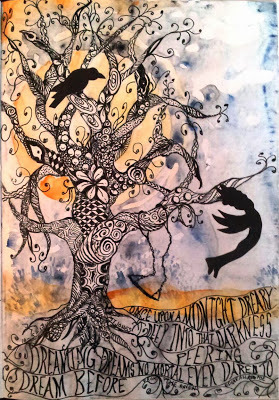 Which brings me back to the whole pantser vs. planner debate. It seems to me that having some kind of plan—like a general idea of character transformation, a series of obstacles and events, or even disparate concepts to be worked into a thematic piece—provides boundaries within which to cultivate creativity and discovery. The goal is to provide a map that provides direction for my muse—but not to the point of suffocating her. That way if she finds an interesting detour between the beginning and the ending she’ll feel confident enough to take a side trip and see where it leads—but without getting totally lost doing it.So while I’m not really a pantser, I’m not a strict planner, either. I guess you might say I’m a pantsed planner!
Which brings me back to the whole pantser vs. planner debate. It seems to me that having some kind of plan—like a general idea of character transformation, a series of obstacles and events, or even disparate concepts to be worked into a thematic piece—provides boundaries within which to cultivate creativity and discovery. The goal is to provide a map that provides direction for my muse—but not to the point of suffocating her. That way if she finds an interesting detour between the beginning and the ending she’ll feel confident enough to take a side trip and see where it leads—but without getting totally lost doing it.So while I’m not really a pantser, I’m not a strict planner, either. I guess you might say I’m a pantsed planner!
Pantsers enjoy the surprise of discovery and say jumping in without a plan guarantees fresh writing. They argue that anything smelling of an outline inhibits creativity and stifles voice. They opt to write by the seats of their pants.Unlike pantsers, planners prefer a roadmap comprised of character sketches, outlines, and sometimes even the ending. They argue that having a plan keeps their writing focused and ensures a cohesive whole.Lately I’ve been researching strategies for structuring novels with the goal of developing a more systematic approach to writing; mostly because I’m the type of pantser writer who starts out gung-ho and then fizzles about fifty pages into a draft. That, and a bunch of recent rejections. I don’t want to stifle voice or inhibit discovery, but I do want to find a more efficient and confident process for writing. But does planning and outlining inhibit creativity? Or can a plan’s structure enhance it?What does this have to do with the October SMACK DAB theme for a creative entry using ‘October Sky’? All the ideas we batted around were good:
· Using the first line of a favorite published work as a jumping off point· Starting with a girl on a swing at midnight· Creative entries about things that go bump in the night· The October sky as a central theme
The more we brainstormed, the more intrigued I grew by the challenge of finding a connection between them all; some unifying element. I wanted to figure out a way to combine them into something more than their individual parts. I am not an artist, by any means, but I do like to journal. As I doodled I discovered that the separate ideas formed a structure within which to create something totally unexpected.
 Which brings me back to the whole pantser vs. planner debate. It seems to me that having some kind of plan—like a general idea of character transformation, a series of obstacles and events, or even disparate concepts to be worked into a thematic piece—provides boundaries within which to cultivate creativity and discovery. The goal is to provide a map that provides direction for my muse—but not to the point of suffocating her. That way if she finds an interesting detour between the beginning and the ending she’ll feel confident enough to take a side trip and see where it leads—but without getting totally lost doing it.So while I’m not really a pantser, I’m not a strict planner, either. I guess you might say I’m a pantsed planner!
Which brings me back to the whole pantser vs. planner debate. It seems to me that having some kind of plan—like a general idea of character transformation, a series of obstacles and events, or even disparate concepts to be worked into a thematic piece—provides boundaries within which to cultivate creativity and discovery. The goal is to provide a map that provides direction for my muse—but not to the point of suffocating her. That way if she finds an interesting detour between the beginning and the ending she’ll feel confident enough to take a side trip and see where it leads—but without getting totally lost doing it.So while I’m not really a pantser, I’m not a strict planner, either. I guess you might say I’m a pantsed planner!
Published on October 10, 2013 06:49
October 5, 2013
Inspired by the October Sky by Deborah Lytton
For our creative month, I thought I would write a few Haikus about October, inspired by the October sky. I hope they will touch your imagination and give you creative ideas for your own writing today.
a carpet of jewels
beneath the October sky
beckons adventure
one lonely pumpkin
overlooked by everyone
except for the crows
October wind blow
stir my imagination
give life to my pen
If you like them, comment by sending one of your own.
Have an exciting October, filled with possibilities!
--Deborah Lytton
a carpet of jewels
beneath the October sky
beckons adventure
one lonely pumpkin
overlooked by everyone
except for the crows
October wind blow
stir my imagination
give life to my pen
If you like them, comment by sending one of your own.
Have an exciting October, filled with possibilities!
--Deborah Lytton
Published on October 05, 2013 09:15
October 4, 2013
My October Sky by Megan
One of my favorite song lyrics comes from Ani DiFranco:
On Wednesday October 2nd, 2013, I decided to risk tripping in hopes of seeing the good stuff. As I went around my daily routine, I paused to look up at the sky. This started as a way to fulfill the creative assignment for October, but proved to be an exercise in mindfulness.
Here are a few pictures that capture what I saw.
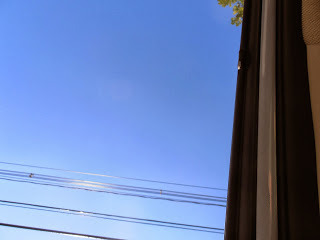 Biddeford, ME 10:30 am
Biddeford, ME 10:30 am
Stopped at a traffic light, driving from the YMCA, where I swam laps, to the Kennebunk Town Offices to pay property taxes.
 Kennebunk, ME 11:15 am
Kennebunk, ME 11:15 am
On the way into the Kennebunk Free Library. Unfortunately I forgot the library doesn't open until 12:30 on Wednesdays.
 Kennebunk, ME 12:45 pm
Kennebunk, ME 12:45 pm
At the playground. My kids and I had a picnic lunch after my son's preschool.
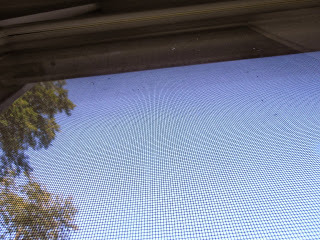 West Kennebunk, ME 1:30 pm
West Kennebunk, ME 1:30 pm
Work time. The view of the sky from my office window. The writing was not the best today, but at least there was writing.
 Mother's Beach, Kennebunk, ME 5:00 pm
Mother's Beach, Kennebunk, ME 5:00 pm
Our family welcomes this extra beach day in October.
 West Kennebunk, ME 8:00 pm
West Kennebunk, ME 8:00 pm
The kids are in bed, back to work.
...when I look down,
I just miss all the good stuff.
And when I look up,
I just trip over things.
On Wednesday October 2nd, 2013, I decided to risk tripping in hopes of seeing the good stuff. As I went around my daily routine, I paused to look up at the sky. This started as a way to fulfill the creative assignment for October, but proved to be an exercise in mindfulness.
Here are a few pictures that capture what I saw.
 Biddeford, ME 10:30 am
Biddeford, ME 10:30 amStopped at a traffic light, driving from the YMCA, where I swam laps, to the Kennebunk Town Offices to pay property taxes.
 Kennebunk, ME 11:15 am
Kennebunk, ME 11:15 amOn the way into the Kennebunk Free Library. Unfortunately I forgot the library doesn't open until 12:30 on Wednesdays.
 Kennebunk, ME 12:45 pm
Kennebunk, ME 12:45 pmAt the playground. My kids and I had a picnic lunch after my son's preschool.
 West Kennebunk, ME 1:30 pm
West Kennebunk, ME 1:30 pmWork time. The view of the sky from my office window. The writing was not the best today, but at least there was writing.
 Mother's Beach, Kennebunk, ME 5:00 pm
Mother's Beach, Kennebunk, ME 5:00 pmOur family welcomes this extra beach day in October.
 West Kennebunk, ME 8:00 pm
West Kennebunk, ME 8:00 pmThe kids are in bed, back to work.
Published on October 04, 2013 02:30
October 3, 2013
WRITING IN AUTUMN: a poem by Irene Latham
 A while back I accidentally wrote a poem titled "Writing in Winter." It's about the moment before you begin, when the white space is waiting for you.
A while back I accidentally wrote a poem titled "Writing in Winter." It's about the moment before you begin, when the white space is waiting for you. That led to other writing poems for the other seasons, each attempting to capture a moment in the writing life.
The "autumn" one, which I offer you today, is about that moment when you make a breakthrough and discover something about your story or characters after struggling along. Perhaps some of you can relate!
Writing in Autumn
We play hide-n-seekon lawn dressed in redand yellow, shuffle paths
the wind soon rearranges.No matter how often we rakeor blow the grass bare
there is always more:pile turns mountainous,our intentions buried,
hidden. We close our lids,weave between the maples,count from one to ten.
Beside us, dog sniffs, plunders, until finallywe see it: blue sleeve,
freckled nose, the point of it allgrinning like a jack-o-lantern,voice clear as sky:
took you long enough
copyright 2013, Irene Latham
If anyone is interested, I happen to have some lovely postcards of "Writing in Summer" and "Writing in Spring." If you'd like one mailed to you, email me with your address: irene (at) irenelatham (dot) com. Happy writing, and thanks for reading!
Published on October 03, 2013 04:00
October 2, 2013
“Middleview” Interview with Debut Author Jennifer Ann Mann
Posted by Tamera Wissinger
Today, Jennifer Ann Mann is joining Smack Dab In The Middle Blog for a guest “middleview” interview. Jennifer’s debut middle grade novel SUNNY SWET IS SO NOT SORRY, from Bloomsbury Publishing, released yesterday, 10/01/2013!Congratulations, Jennifer!
Here is Jennifer’s short biography:
 Jennifer Ann Mann grew up in New Jersey, the second of four sisters. Her short stories have been published by Highlights for Children, where she won the 2007 Fiction Contest. She lives in Boston in a giant house filled with kids and cats. This coming fall, Bloomsbury USA Children’s Books will publish Jennifer’s debut novel, Sunny Sweet is So Not Sorry, the first book in the Sunny Sweet Series.
Jennifer Ann Mann grew up in New Jersey, the second of four sisters. Her short stories have been published by Highlights for Children, where she won the 2007 Fiction Contest. She lives in Boston in a giant house filled with kids and cats. This coming fall, Bloomsbury USA Children’s Books will publish Jennifer’s debut novel, Sunny Sweet is So Not Sorry, the first book in the Sunny Sweet Series.Here’s a description of SUNNY SWEET IS SO NOT SORRY:
One little sister, some homemade super glue, and about a million plastic flowers. That’s all it took to make a totally regular morning turn into a super crazy day! Masha has always known her little sister, Sunny, was an evil genius. But this time, Sunny has gone too far. The glue she used to attach plastic daisies to Masha’s head won’t come off! The girls have to stay home from school, and Sunny sets out on an adventure to help fix Masha’s head. Fix it? Yeah, right! Masha just wants to stick to the rules for once. Sunny plans on testing every single one. When this adventure is over, Sunny Sweet is going to be so sorry!
Here are the links to Jennifer online: Website, Facebook, Twitter, Goodreads
Now it’s time to hear from our guest:
Smack Dab Middleview with SUNNY SWEET IS SO NOT SORRY author Jennifer Ann Mann
1. What does your main character, Masha want?
Masha wants her old life back, before her parent’s divorce and their subsequent move. In that old life she was Masha Sweet, daughter to Principal Sweet. She felt important and had a deep sense of belonging. In her new life, Masha lives in a town where no one can say her name correctly, attends a school where she has zero friends, and is forced to be more responsible for her little sister, Sunny, since her mother has a new job. This last part is so NOT easy…considering that Sunny is an evil genius who never stops tormenting her big sister. The story begins with Masha waking up for school and discovering that Sunny has glued plastic flowers into her hair.
2. What is in her way?
Masha believes all her troubles stem from her little sister, Sunny Sweet. In reality, Masha is in her own way and needs to accept that things have changed. This is not easy for anyone, especially not for an 11 year-old that has just woken up with plastic flowers glued to their head!
 3. Did you know right away that this was your story, or did you discover it as you wrote? How did the story evolve?
3. Did you know right away that this was your story, or did you discover it as you wrote? How did the story evolve?
I grew up the second of four sisters. You could say that I was born to write a sister story. As a long suffering big sister, I (of course) wrote a story where everything is the fault of a dastardly little sister.
4. Was SUNNY SWEET IS SO NOT SORRY always for middle grade readers or not? If so, why did you choose middle grade? If not, what had to change for it to be considered a middle grade novel?
Not once did I think about the age I was writing for; I just wrote. My agent pronounced it MG, and after the book sold, my editor had me tone down the divorce. The original manuscript had a lot more detail regarding the divorce, including an affair of the father’s and more anguish on the part of the mother. (The story was generally darker.) My editor asked me to focus on the sisters and their relationship so that Sunny and Masha could continue their capers as a series. At first, I admit that there was sadness on my part for the loss of this aspect of the story, but soon, the shenanigans of Masha and Sunny had me laughing and writing.
5. What is the best part of writing for middle grade readers?
Most days I still feel as if I’m 11 years-old, so writing MG comes naturally. I also love the way kids this age think - they’re not yet focused on self and sex and therefore have more time to ponder life’s bigger questions. They’re like adorable mini philosophers looking at life in a very pure, un-jaded way.
6. Is there any downside?
Absolutely none when it comes to the writing of the story, although the marketing of middle grade seems to be more difficult than for young adult. Older kids and adults make their choices in purchasing and reading books while younger kids rely much more on adults to make the choices for them, creating an extra layer between the book and its reader.
7. What is the most difficult part of writing for you?
Plot. I love character. I have a blast thinking, chatting, and feeling as Masha and Sunny. I spend hours writing my characters thoughts about food, friends, making their beds, homework, parents, etc. It’s so much fun. I hate the fact that something has to happen!
Thank you for joining us for a Middleview at Smack Dab Blog, Jennifer. Again, congratulations on the release of SUNNY SWEET IS SO NOT SORRY! We’ll look for it on bookshelves!
Published on October 02, 2013 03:00
September 30, 2013
Taking Leaps! (September Theme) by Christine Brodien-Jones
 1. Leaping into book festivals and fun author events~ My favorite way to connect with enthusiastic young readers! This September I took part in the awesome Warwick Children’s Book Festival at the elementary school in Warwick, NY. Next I’ll be at the “Inside Story” event at the Odyssey Bookstore in South Hadley MA, where traditionally-published authors and illustrators will share the "inside story" behind their recent publications.
1. Leaping into book festivals and fun author events~ My favorite way to connect with enthusiastic young readers! This September I took part in the awesome Warwick Children’s Book Festival at the elementary school in Warwick, NY. Next I’ll be at the “Inside Story” event at the Odyssey Bookstore in South Hadley MA, where traditionally-published authors and illustrators will share the "inside story" behind their recent publications.

2. Leaping into a new manuscript~
 The scariest part of writing: that blank page in front of you! I’m working on a new middle-grade thriller fantasy set in Galicia, Spain – which means diving into Galician mythology, studying the art of gargoyle-carving and delving into all things Spanish and medieval.
The scariest part of writing: that blank page in front of you! I’m working on a new middle-grade thriller fantasy set in Galicia, Spain – which means diving into Galician mythology, studying the art of gargoyle-carving and delving into all things Spanish and medieval.
 3. Leaping into the pages of a well-loved book~
3. Leaping into the pages of a well-loved book~
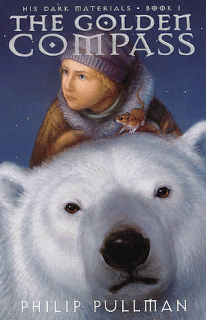 Providing I could have a dæmon of my own, I’d happily spend a day with Lyra Belacqua, the feisty heroine of The Golden Compass, the first book in Philip Pullman’s His Dark Materials Trilogy. I’m willing to jump into the pages at any point: spying on the Jordan College scholars, traveling with the Gyptians on their narrow boat or journeying to the far north to confront witch clans and armored polar bears. Maybe Lyra would teach me how to read her mysterious alethiometer. How cool would that be?
Providing I could have a dæmon of my own, I’d happily spend a day with Lyra Belacqua, the feisty heroine of The Golden Compass, the first book in Philip Pullman’s His Dark Materials Trilogy. I’m willing to jump into the pages at any point: spying on the Jordan College scholars, traveling with the Gyptians on their narrow boat or journeying to the far north to confront witch clans and armored polar bears. Maybe Lyra would teach me how to read her mysterious alethiometer. How cool would that be?
Published on September 30, 2013 09:34
September 28, 2013
Taking the Leap September Theme (Jen Cervantes)
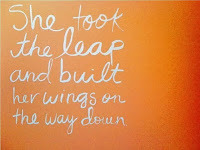 So I know I’ve told you all about jumping into YA head first (and yes, it took a leap of faith too). That was a little over a year ago. On September 3, I sent the completed YA manuscript to my agent. There were times I didn’t think I’d finish. There were times I had no idea where the characters or the story were going. There were times I wanted to give up and start something new (because that’s so much more fun than the muddled middle). But this story, these characters grabbed me and didn’t let go. I admit I haven’t done any writing since I sent off the ms. But I’ve done lots of thinking, and mulling over new ideas. Nothing has quite stuck yet. I think it’s because my heart is still buried in NORTH (tentative title). But this is the best part of the process for me—the part where I get to dream and imagine, knowing when inspiration strikes, I'll take the leap again.
So I know I’ve told you all about jumping into YA head first (and yes, it took a leap of faith too). That was a little over a year ago. On September 3, I sent the completed YA manuscript to my agent. There were times I didn’t think I’d finish. There were times I had no idea where the characters or the story were going. There were times I wanted to give up and start something new (because that’s so much more fun than the muddled middle). But this story, these characters grabbed me and didn’t let go. I admit I haven’t done any writing since I sent off the ms. But I’ve done lots of thinking, and mulling over new ideas. Nothing has quite stuck yet. I think it’s because my heart is still buried in NORTH (tentative title). But this is the best part of the process for me—the part where I get to dream and imagine, knowing when inspiration strikes, I'll take the leap again.
Published on September 28, 2013 22:00
September 26, 2013
Writing Myself by Olugbemisola Rhuday-Perkovich
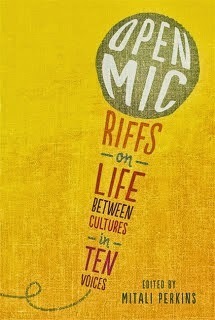 I'm jumping into September feeling a little...exposed, and it's uncomfortable. I think of my public self as an author of fiction, but this month I have two nonfiction publications out, work in which I wrote about...me. I hate talking about myself, and in OPEN MIC: Riffs on Life Between Cultures in Ten Voices, edited by Mitali Perkins, not only do I talk about myself, I talk about my teen self, which was as awkward as you might imagine. In Luke Reynolds' BREAK THESE RULES, I share an idea that has guided me since childhood days -- that in a world when we are often told to constantly speak up and shout out, there is a special value in listening, paying attention -- and *then* speaking up in the way most authentic for ourselves.
I'm jumping into September feeling a little...exposed, and it's uncomfortable. I think of my public self as an author of fiction, but this month I have two nonfiction publications out, work in which I wrote about...me. I hate talking about myself, and in OPEN MIC: Riffs on Life Between Cultures in Ten Voices, edited by Mitali Perkins, not only do I talk about myself, I talk about my teen self, which was as awkward as you might imagine. In Luke Reynolds' BREAK THESE RULES, I share an idea that has guided me since childhood days -- that in a world when we are often told to constantly speak up and shout out, there is a special value in listening, paying attention -- and *then* speaking up in the way most authentic for ourselves.So it's a little weird, putting myself, not a character, "out there" like that, but I know it's good. I believe that good writing should involve discomfort. Letting one's world be shaken up a little. Developing a new perspective from exposure to new people, ideas, and things. From trying, and failing, and trying again.
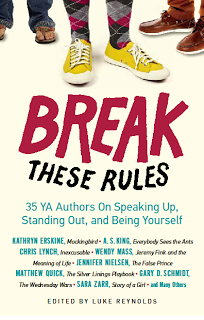 So, I'm working on the next thing. It's a bit of a mess right now, and it's way uncomfortable. But writing autobiographically allowed me to reflect in ways that I already see have benefited my fiction. And that's exciting.
So, I'm working on the next thing. It's a bit of a mess right now, and it's way uncomfortable. But writing autobiographically allowed me to reflect in ways that I already see have benefited my fiction. And that's exciting.
Published on September 26, 2013 04:49



